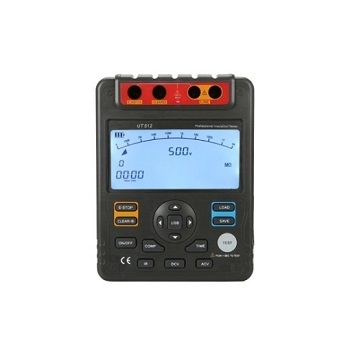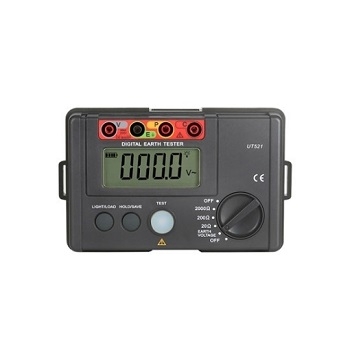An Insulation Resistance Tester, often referred to as a "megohmmeter" or simply "megger," is an electrical testing instrument used to measure the electrical resistance of insulating materials. Its primary purpose is to evaluate the integrity and quality of insulation in electrical systems, cables, wires, windings, and other components. This type of testing helps ensure the safe and reliable operation of electrical equipment and systems. Here, for you to introduce more details.
Operating Principle
Insulation resistance testers are based on Ohm's law. The value of insulation resistance can be calculated by loading a known DC voltage and measuring the current flowing through the insulating material. Theoretically, the value of insulation resistance is large, but not infinite, so by measuring the insulation material with a small current, the insulation resistance tester calculates and displays the value of the insulation resistance, which represents how good the insulation material is. The electrical insulation between two conductors indicates the risk of leakage currents in the insulating material.
Main Types
- Handheld Insulation Resistance Testers:
Battery-Powered: These are portable and handheld devices powered by internal batteries, making them suitable for field use. They are often used for routine insulation resistance testing on electrical equipment and systems. Battery-powered models are typically available in a wide range of voltage options, from a few hundred volts to several kilovolts. - Benchtop Insulation Resistance Testers:
Line-Powered: Benchtop insulation resistance testers are designed for more controlled and laboratory-like testing environments. They are typically powered from a standard electrical outlet and offer a range of voltage options for high-precision testing. These models are often equipped with advanced features for research, quality control, and certification purposes. - Motorized Insulation Resistance Testers:
These testers are often used for testing large rotating machinery like motors and generators. They provide automated testing procedures, including the application of the test voltage, measurement, and data recording. Motorized testers are designed for high-voltage testing to ensure the insulation quality of heavy electrical machinery. - Digital Insulation Resistance Testers:
Digital insulation tester supports insulation resistance at 100V, 250V, 500V, and 1000V test voltages and has digital displays, and often offers advanced features like data logging, real-time data analysis, and the ability to store and retrieve test results. - Analog Insulation Resistance Testers:
Analog insulation resistance testers have analog needle or meter displays. While they lack the digital features of their digital counterparts, they are simple and straightforward to use. They provide a visual indication of insulation resistance and are often more affordable. - Megohmmeter and Earth Tester Combination Devices:
Some instruments combine insulation resistance testing with earth (ground) resistance measurement capabilities. These devices are particularly useful for assessing the overall safety and integrity of electrical systems. - Specialized Insulation Resistance Testers:
Some testers are designed for specific applications or industries. For example, there are insulation resistance testers tailored for testing insulation in high-voltage transmission lines, power substations, and other high-energy environments. These testers often come with specialized safety features and higher voltage capabilities. - Megohmmeters for High-Voltage Testing:
These testers are designed for applications requiring extremely high voltage levels, such as testing the insulation in power transformers and high-voltage cables. They can generate voltages in excess of several tens of kilovolts. - Hand-Cranked or Hand-Operated Insulation Resistance Testers:
Some insulation resistance testers are designed to be operated manually without the need for batteries or external power sources. These models are often used in remote or off-grid locations where power sources are limited.
Advantages and Disadvantages
Advantages
- 1. Early Detection of Insulation Issues: Insulation resistance testing allows for the early detection of problems such as deteriorating insulation, moisture ingress, contamination, and physical damage. This proactive approach helps prevent electrical failures and costly downtime.
- 2. Safety: Ensuring the integrity of insulation is critical for electrical safety. Properly insulated electrical systems are less likely to pose electrical shock hazards or fire risks. Insulation resistance testing helps ensure the safety of personnel and equipment.
- 3. Quality Control: Manufacturers use insulation resistance testing during the production of electrical equipment to verify the quality of insulation in newly manufactured components. This ensures that products meet industry standards and specifications.
- 4. Compliance with Standards: In certain industries and electrical installations, there are regulations and standards that require periodic insulation resistance testing. Compliance with these standards is essential for safety and legal reasons.
- 5. Data Logging and Analysis: Many modern insulation resistance testers offer data logging and analysis capabilities. This allows for the recording of test results over time, facilitating trend analysis and data-driven decision-making.
Disadvantages
- 1. High Voltage: Insulation resistance testing typically involves applying high-voltage DC signals to the equipment under test. This high voltage can be hazardous if not handled properly and can be a disadvantage in terms of safety, especially in certain work environments.
- 2. Time-Consuming: The testing process can be time-consuming, especially when performed on large systems or equipment. It may require disconnecting equipment from power sources, which can lead to downtime.
- 3. Cost: High-quality insulation resistance testers can be expensive, especially those designed for high-voltage testing and precision measurements. Additionally, regular testing may necessitate additional costs for maintenance and calibration.
- 4. Varied Environmental Conditions: The accuracy of insulation resistance measurements can be affected by factors such as temperature, humidity, and contamination. Special precautions and adjustments may be needed to account for these conditions.
- 5. Limited to Electrical Insulation: Insulation resistance testing is primarily designed for assessing electrical insulation. It may not be suitable for evaluating the integrity of non-electrical insulating materials.
Insulation resistance testers come in various models with different voltage ranges, measurement capabilities, and additional features. The choice of a specific model depends on the application and the voltage levels involved. sisco offers a variety of insulation resistance testers for you to choose from, such as ground resistance testers and so on.

